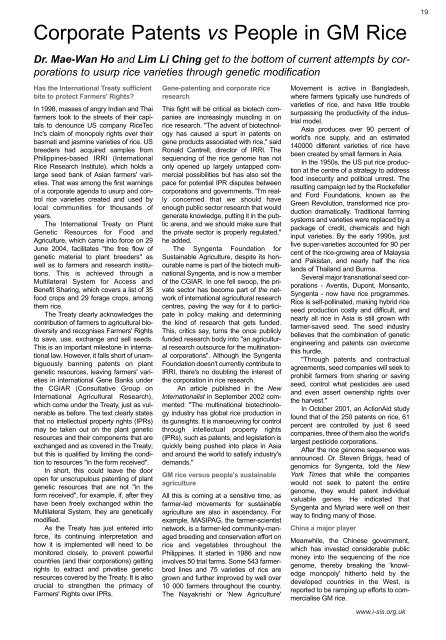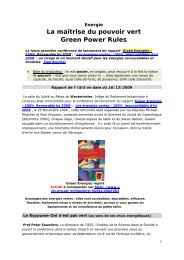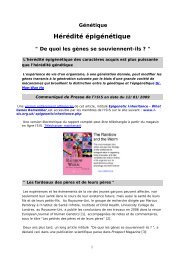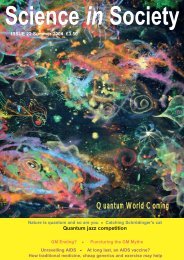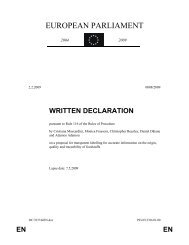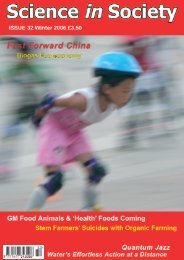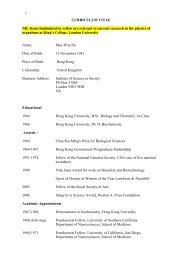Ethiopia goes organic to feed herself - The Institute of Science In ...
Ethiopia goes organic to feed herself - The Institute of Science In ...
Ethiopia goes organic to feed herself - The Institute of Science In ...
Create successful ePaper yourself
Turn your PDF publications into a flip-book with our unique Google optimized e-Paper software.
Corporate Patents vs People in GM Rice<br />
19<br />
Dr. Mae-Wan Ho and Lim Li Ching get <strong>to</strong> the bot<strong>to</strong>m <strong>of</strong> current attempts by corporations<br />
<strong>to</strong> usurp rice varieties through genetic modification<br />
Has the <strong>In</strong>ternational Treaty sufficient<br />
bite <strong>to</strong> protect Farmers' Rights?<br />
<strong>In</strong> 1998, masses <strong>of</strong> angry <strong>In</strong>dian and Thai<br />
farmers <strong>to</strong>ok <strong>to</strong> the streets <strong>of</strong> their capitals<br />
<strong>to</strong> denounce US company RiceTec<br />
<strong>In</strong>c's claim <strong>of</strong> monopoly rights over their<br />
basmati and jasmine varieties <strong>of</strong> rice. US<br />
breeders had acquired samples from<br />
Philippines-based IRRI (<strong>In</strong>ternational<br />
Rice Research <strong><strong>In</strong>stitute</strong>), which holds a<br />
large seed bank <strong>of</strong> Asian farmers' varieties.<br />
That was among the first warnings<br />
<strong>of</strong> a corporate agenda <strong>to</strong> usurp and control<br />
rice varieties created and used by<br />
local communities for thousands <strong>of</strong><br />
years.<br />
<strong>The</strong> <strong>In</strong>ternational Treaty on Plant<br />
Genetic Resources for Food and<br />
Agriculture, which came in<strong>to</strong> force on 29<br />
June 2004, facilitates "the free flow <strong>of</strong><br />
genetic material <strong>to</strong> plant breeders" as<br />
well as <strong>to</strong> farmers and research institutions.<br />
This is achieved through a<br />
Multilateral System for Access and<br />
Benefit Sharing, which covers a list <strong>of</strong> 35<br />
food crops and 29 forage crops, among<br />
them rice.<br />
<strong>The</strong> Treaty clearly acknowledges the<br />
contribution <strong>of</strong> farmers <strong>to</strong> agricultural biodiversity<br />
and recognises Farmers' Rights<br />
<strong>to</strong> save, use, exchange and sell seeds.<br />
This is an important miles<strong>to</strong>ne in international<br />
law. However, it falls short <strong>of</strong> unambiguously<br />
banning patents on plant<br />
genetic resources, leaving farmers' varieties<br />
in international Gene Banks under<br />
the CGIAR (Consultative Group on<br />
<strong>In</strong>ternational Agricultural Research),<br />
which come under the Treaty, just as vulnerable<br />
as before. <strong>The</strong> text clearly states<br />
that no intellectual property rights (IPRs)<br />
may be taken out on the plant genetic<br />
resources and their components that are<br />
exchanged and as covered in the Treaty;<br />
but this is qualified by limiting the condition<br />
<strong>to</strong> resources "in the form received".<br />
<strong>In</strong> short, this could leave the door<br />
open for unscrupulous patenting <strong>of</strong> plant<br />
genetic resources that are not "in the<br />
form received", for example, if, after they<br />
have been freely exchanged within the<br />
Multilateral System, they are genetically<br />
modified.<br />
As the Treaty has just entered in<strong>to</strong><br />
force, its continuing interpretation and<br />
how it is implemented will need <strong>to</strong> be<br />
moni<strong>to</strong>red closely, <strong>to</strong> prevent powerful<br />
countries (and their corporations) getting<br />
rights <strong>to</strong> extract and privatise genetic<br />
resources covered by the Treaty. It is also<br />
crucial <strong>to</strong> strengthen the primacy <strong>of</strong><br />
Farmers' Rights over IPRs.<br />
Gene-patenting and corporate rice<br />
research<br />
This fight will be critical as biotech companies<br />
are increasingly muscling in on<br />
rice research. "<strong>The</strong> advent <strong>of</strong> biotechnology<br />
has caused a spurt in patents on<br />
gene products associated with rice," said<br />
Ronald Cantrell, direc<strong>to</strong>r <strong>of</strong> IRRI. <strong>The</strong><br />
sequencing <strong>of</strong> the rice genome has not<br />
only opened up largely untapped commercial<br />
possibilities but has also set the<br />
pace for potential IPR disputes between<br />
corporations and governments. "I'm really<br />
concerned that we should have<br />
enough public sec<strong>to</strong>r research that would<br />
generate knowledge, putting it in the public<br />
arena, and we should make sure that<br />
the private sec<strong>to</strong>r is properly regulated,"<br />
he added.<br />
<strong>The</strong> Syngenta Foundation for<br />
Sustainable Agriculture, despite its honourable<br />
name is part <strong>of</strong> the biotech multinational<br />
Syngenta, and is now a member<br />
<strong>of</strong> the CGIAR. <strong>In</strong> one fell swoop, the private<br />
sec<strong>to</strong>r has become part <strong>of</strong> the network<br />
<strong>of</strong> international agricultural research<br />
centres, paving the way for it <strong>to</strong> participate<br />
in policy making and determining<br />
the kind <strong>of</strong> research that gets funded.<br />
This, critics say, turns the once publicly<br />
funded research body in<strong>to</strong> "an agricultural<br />
research outsource for the multinational<br />
corporations". Although the Syngenta<br />
Foundation doesn't currently contribute <strong>to</strong><br />
IRRI, there's no doubting the interest <strong>of</strong><br />
the corporation in rice research.<br />
An article published in the New<br />
<strong>In</strong>ternationalist in September 2002 commented:<br />
"<strong>The</strong> multinational biotechnology<br />
industry has global rice production in<br />
its gunsights. It is manoeuvring for control<br />
through intellectual property rights<br />
(IPRs), such as patents, and legislation is<br />
quickly being pushed in<strong>to</strong> place in Asia<br />
and around the world <strong>to</strong> satisfy industry's<br />
demands."<br />
GM rice versus people's sustainable<br />
agriculture<br />
All this is coming at a sensitive time, as<br />
farmer-led movements for sustainable<br />
agriculture are also in ascendancy. For<br />
example, MASIPAG, the farmer-scientist<br />
network, is a farmer-led community-managed<br />
breeding and conservation effort on<br />
rice and vegetables throughout the<br />
Philippines. It started in 1986 and now<br />
involves 50 trial farms. Some 543 farmerbred<br />
lines and 75 varieties <strong>of</strong> rice are<br />
grown and further improved by well over<br />
10 000 farmers throughout the country.<br />
<strong>The</strong> Nayakrishi or 'New Agriculture'<br />
Movement is active in Bangladesh,<br />
where farmers typically use hundreds <strong>of</strong><br />
varieties <strong>of</strong> rice, and have little trouble<br />
surpassing the productivity <strong>of</strong> the industrial<br />
model.<br />
Asia produces over 90 percent <strong>of</strong><br />
world's rice supply, and an estimated<br />
140000 different varieties <strong>of</strong> rice have<br />
been created by small farmers in Asia.<br />
<strong>In</strong> the 1950s, the US put rice production<br />
at the centre <strong>of</strong> a strategy <strong>to</strong> address<br />
food insecurity and political unrest. <strong>The</strong><br />
resulting campaign led by the Rockefeller<br />
and Ford Foundations, known as the<br />
Green Revolution, transformed rice production<br />
dramatically. Traditional farming<br />
systems and varieties were replaced by a<br />
package <strong>of</strong> credit, chemicals and high<br />
input varieties. By the early 1990s, just<br />
five super-varieties accounted for 90 per<br />
cent <strong>of</strong> the rice-growing area <strong>of</strong> Malaysia<br />
and Pakistan, and nearly half the rice<br />
lands <strong>of</strong> Thailand and Burma.<br />
Several major transnational seed corporations<br />
- Aventis, Dupont, Monsan<strong>to</strong>,<br />
Syngenta - now have rice programmes.<br />
Rice is self-pollinated, making hybrid rice<br />
seed production costly and difficult, and<br />
nearly all rice in Asia is still grown with<br />
farmer-saved seed. <strong>The</strong> seed industry<br />
believes that the combination <strong>of</strong> genetic<br />
engineering and patents can overcome<br />
this hurdle.<br />
"Through patents and contractual<br />
agreements, seed companies will seek <strong>to</strong><br />
prohibit farmers from sharing or saving<br />
seed, control what pesticides are used<br />
and even assert ownership rights over<br />
the harvest."<br />
<strong>In</strong> Oc<strong>to</strong>ber 2001, an ActionAid study<br />
found that <strong>of</strong> the 250 patents on rice, 61<br />
percent are controlled by just 6 seed<br />
companies, three <strong>of</strong> them also the world's<br />
largest pesticide corporations.<br />
After the rice genome sequence was<br />
announced. Dr. Steven Briggs, head <strong>of</strong><br />
genomics for Syngenta, <strong>to</strong>ld the New<br />
York Times that while the companies<br />
would not seek <strong>to</strong> patent the entire<br />
genome, they would patent individual<br />
valuable genes. He indicated that<br />
Syngenta and Myriad were well on their<br />
way <strong>to</strong> finding many <strong>of</strong> those.<br />
China a major player<br />
Meanwhile, the Chinese government,<br />
which has invested considerable public<br />
money in<strong>to</strong> the sequencing <strong>of</strong> the rice<br />
genome, thereby breaking the 'knowledge<br />
monopoly' hither<strong>to</strong> held by the<br />
developed countries in the West, is<br />
reported <strong>to</strong> be ramping up efforts <strong>to</strong> commercialise<br />
GM rice.<br />
www.i-sis.org.uk


